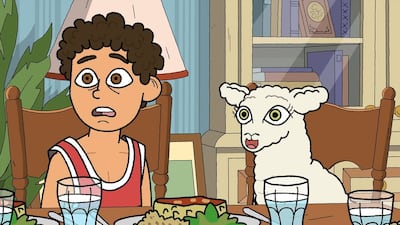The Arab world has had a long-standing appreciation of cartoons and animated series, beginning with the arrival of Japanese shows dubbed in Arabic. Since then, Arab creatives have developed their own animated series, offering fresh perspectives on their culture and stories that had previously gone untold.
Comedian Ramy Youssef is the latest to create an animated show about his Arab culture. #1 Happy Family USA is inspired by Youssef’s own experience of growing up in the US during and after the events of September 11.
Ahead of #1 Happy Family USA’s release on Amazon Prime Video in April, The National looks at some of the funniest and most significant animation series and cartoons for grown-ups created by Arab talent.
Masameer

It began as a series on YouTube, but Masameer has since evolved into a theatrical feature film, followed by a full-fledged animated TV series, Masameer County. The show, created by Faisal Alamer, Abdulaziz Al-Muzaini and Malik Nejer, is a satire of Saudi society and the many people that inhabit it.
Masameer, which translates to nails, is drawn in a style that emphasises facial expressions rather than physical comedy, leaning on the strength of the scripts to make the show as popular as it is today. The characters in the series have been voiced by its creators as well as comedians from Saudi Arabia such as Youssef Al Dakhil and Ibraheem Alkhairallah.
Shaabiat Al-Cartoon
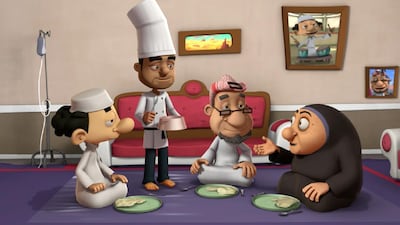
A staple of Ramadan programming since 2006, Shaabiat Al-Cartoon is an Emirati comedy animation about the many cultures that make up the fabric of UAE society. Created by Haidar Mohammed and Adnan Al-Obthani, the show was directed by Amer Koukh in its first five seasons and then by Mohammed from the sixth until the most recent.
Set in Dubai, the show features caricatures of different nationalities as they navigate the evolving and expanding culture of the country. The show’s style has gone through many iterations, beginning with simple 2D in its first seasons until it was changed to 3D, before being changed back to 2D to celebrate the show’s origins.
Freej
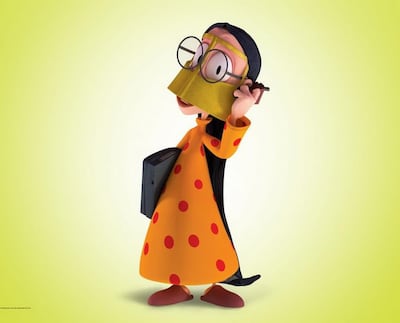
Mohammed Saeed Harib’s Freej also began in 2006. The show was an instant hit upon release in Ramadan, with many waiting patiently for the newest episode to air before the days of streaming. The show features four grandmothers with distinct personalities, each with her own catchphrase.
The title, which means neighbourhood in colloquial Emirati Arabic, is apt as it is a focused version of UAE society. The grandmothers go on escapades as they experience cutting-edge technology and visit Dubai’s newest buildings and projects. Testament to the popularity of the show, the characters have since featured in airline flydubai’s safety video.
The 99
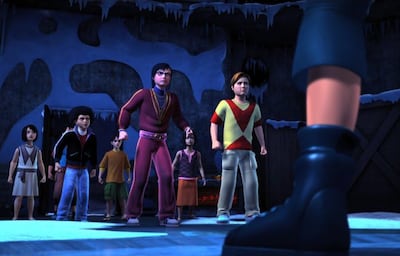
Kuwaiti writer, entrepreneur and clinical psychologist Dr Naif Al-Mutawa's comic book The 99 was adapted into an animation series in 2011. The story follows Dr Ramzi Razem and 99 young people from around the world who possess ancient powers. Razem wants the 99 to use their powers for good, but an evil character named Rughal wants them for nefarious means.
The series ran for 52 episodes and featured the voices of Matthew Gorman, Sara Clare and professional wrestler Matt Hardy. Despite being written for younger viewers, the show’s mature and serious themes have won over audiences of all ages.
Almasaqeel
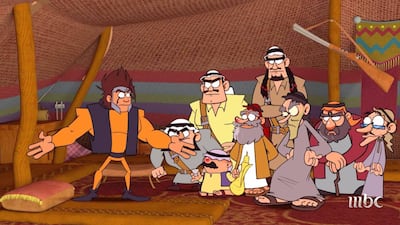
Almasaqeel, produced in Jordan, debuted on MBC in 2011 and ran for three seasons. The show is a satire of Jordanian society from the point of view of its Bedouin populations. Created by Moayed Zidan, the show’s characters were voiced by Mutlaq Matar, Mohammad Alqass and Mishal Almutairi. Almasaqeel's episodes were short, often only between five to six minutes, as they appeared between shows during Ramadan.
